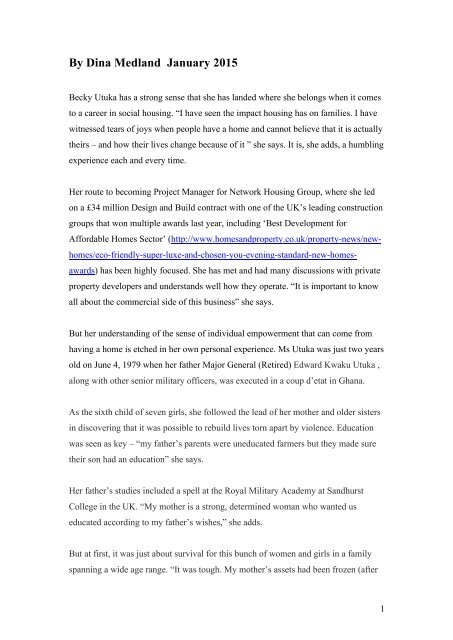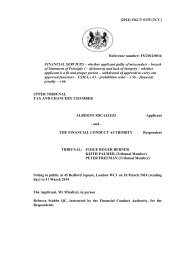Becky Utuka Interview Network Housing
Becky Utuka Interview Network Housing
Becky Utuka Interview Network Housing
You also want an ePaper? Increase the reach of your titles
YUMPU automatically turns print PDFs into web optimized ePapers that Google loves.
By Dina Medland January 2015<br />
<strong>Becky</strong> <strong>Utuka</strong> has a strong sense that she has landed where she belongs when it comes<br />
to a career in social housing. “I have seen the impact housing has on families. I have<br />
witnessed tears of joys when people have a home and cannot believe that it is actually<br />
theirs – and how their lives change because of it ” she says. It is, she adds, a humbling<br />
experience each and every time.<br />
Her route to becoming Project Manager for <strong>Network</strong> <strong>Housing</strong> Group, where she led<br />
on a £34 million Design and Build contract with one of the UK’s leading construction<br />
groups that won multiple awards last year, including ‘Best Development for<br />
Affordable Homes Sector’ (http://www.homesandproperty.co.uk/property-news/newhomes/eco-friendly-super-luxe-and-chosen-you-evening-standard-new-homesawards)<br />
has been highly focused. She has met and had many discussions with private<br />
property developers and understands well how they operate. “It is important to know<br />
all about the commercial side of this business” she says.<br />
But her understanding of the sense of individual empowerment that can come from<br />
having a home is etched in her own personal experience. Ms <strong>Utuka</strong> was just two years<br />
old on June 4, 1979 when her father Major General (Retired) Edward Kwaku <strong>Utuka</strong> ,<br />
along with other senior military officers, was executed in a coup d’etat in Ghana.<br />
As the sixth child of seven girls, she followed the lead of her mother and older sisters<br />
in discovering that it was possible to rebuild lives torn apart by violence. Education<br />
was seen as key – “my father’s parents were uneducated farmers but they made sure<br />
their son had an education” she says.<br />
Her father’s studies included a spell at the Royal Military Academy at Sandhurst<br />
College in the UK. “My mother is a strong, determined woman who wanted us<br />
educated according to my father’s wishes,” she adds.<br />
But at first, it was just about survival for this bunch of women and girls in a family<br />
spanning a wide age range. “It was tough. My mother’s assets had been frozen (after<br />
1
the coup) and she had to find a place for us to live. We rented at first but she believed<br />
in having a permanent home. The plot of land next to our rental was for sale – she<br />
bought it and then built a four bedroom home” says Ms <strong>Utuka</strong>.<br />
“Some of us lived with aunties and uncles. We had to be mindful about what we said,<br />
and with whom we associated. It was very scary at times – I remember once at<br />
primary school she came quickly to get us because suddenly there were rumours of<br />
another coup.”<br />
Asked what it was like living in a house of women, she laughs, saying: “There was a<br />
lot of female support. It was great living with my sisters who were so much older than<br />
me – but then sometimes when I wanted to do things and was told I couldn’t do them,<br />
it was hard.”<br />
In an all-female household “we never had specific male/female tasks – like washing<br />
the car –we were brought up to just do whatever needed doing” says Ms <strong>Utuka</strong>.<br />
Having first chosen to study for a BsC in Design at the College of Architecture &<br />
Planning at Ghana’s University of Science & Technology, she took a ‘Gap Year’ in<br />
London to be with her sister, and changed her mind. “My mother was not pleased.<br />
She kept saying ‘you have to finish what you start” she says.<br />
But, having decided she wanted to be in London where she had family and support,<br />
she did her research on the property sector and opted for an MsC at the University of<br />
Greenwich in Real Estate Development and Investment. “The core content was real<br />
estate development but I wanted something different. This seemed to offer a chance to<br />
keep my options open: I could work for a developer, an investment fund – and also<br />
social housing” she says today.<br />
In her first working role with Basildon District Council as a student placement, she<br />
attended a meeting with Swan <strong>Housing</strong> Group – and saw the ‘Graduate Projects<br />
Manager’ job advertised on the screen on the way in. Later, in that very role she was<br />
to gain hands-on experience of housing development, procurement and finance – and<br />
to manage projects during the defects liability period.<br />
2
Moving up through the ranks at Swan <strong>Housing</strong> to become Project Manager, Ms <strong>Utuka</strong><br />
was in full-time employment and married with a seven-month old son when she<br />
undertook a Master’s degree at the College of Estate Management in Reading. This<br />
gave her a Graduate Diploma in Construction Surveying.<br />
In August 2013 she joined <strong>Network</strong> <strong>Housing</strong> Group, and has since managed a number<br />
of complex Design & Build contracts, sales agreements, development agreements and<br />
construction management Projects. But her appetite for continuing education remains<br />
undiminished. “I plan to study design or architecture further – it would be great to<br />
complete what I started in my undergraduate degree” she tells me.<br />
She is also keen to improve her understanding of construction law and is working on a<br />
pilot scheme with <strong>Network</strong> <strong>Housing</strong> to explore construction package procurement and<br />
the negotiation of contracts directly from the supply chain. As central London tops the<br />
world as the most expensive city for construction<br />
(http://www.ft.com/cms/s/0/a31b9be8-9bea-11e4-a6b6-<br />
00144feabdc0.html#axzz3OvIHWSHi) there are multiple challenges ahead for the<br />
social housing sector.<br />
According to a report published this week by London First, the business advocacy<br />
group, about 50,000 new homes are needed each year - yet less than half of those are<br />
being built. (http://londonfirst.co.uk/campaigns/world-class-infrastructure/)<br />
There is certainly no shortage of demand for talent and innovation in this sector, and<br />
for the businesses that could lose much-needed talent as a result of a lack of<br />
affordable housing.<br />
Ms <strong>Utuka</strong>, currently also finding time to volunteer for BME charities in deprived<br />
areas across North London, is also keen one day to return to Ghana and assist with<br />
housing development.<br />
3
In the meantime, she holds close the words of the poet William Ernest Henley who<br />
was first introduced to her by her father: “I am the master of my fate: I am the captain<br />
of my soul.”<br />
ends<br />
4




